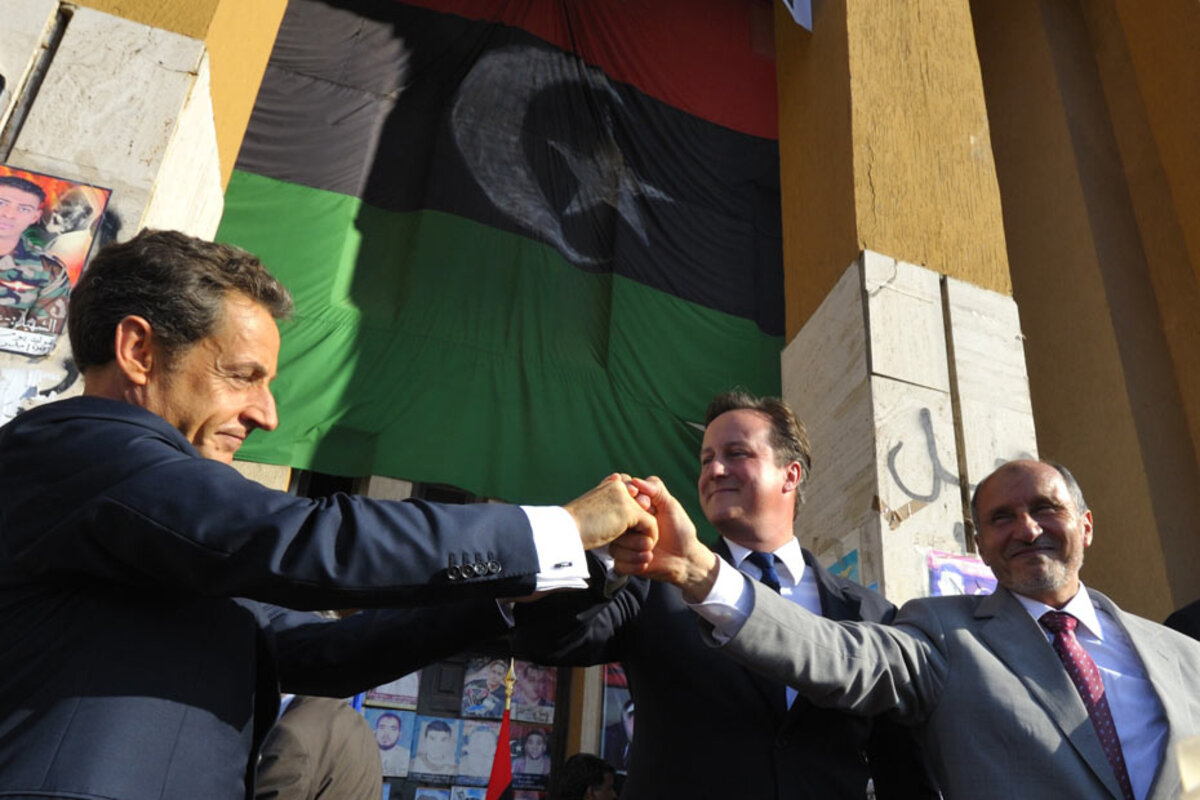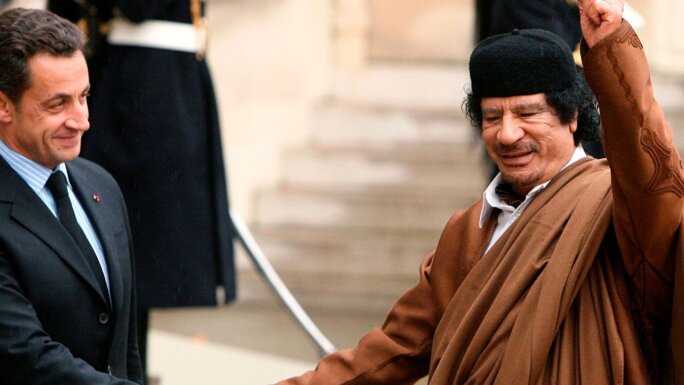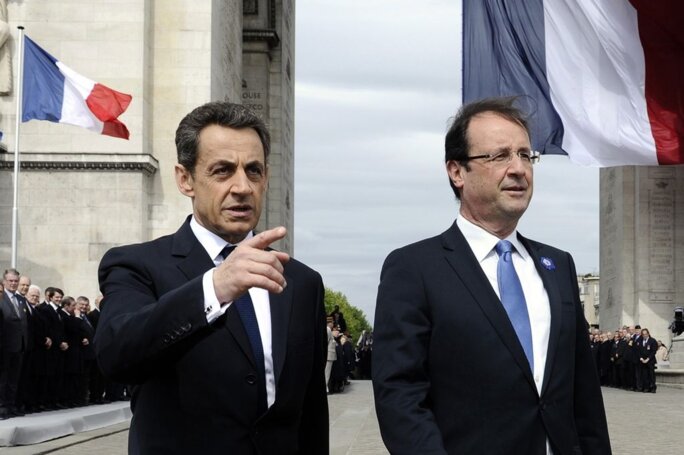Since Nicolas Sarkozy’s exit from the Elysée Palace in 2012, following his electoral defeat by socialist rival François Hollande, the political powers in place in France have recurrently avoided any proper public investigation of the relationship between Sarkozy and the late Libyan dictator Muammar Gaddafi.
That is the case despite the suspicions that Sarkozy’s 2007 election campaign was funded by Tripoli – which the former president firmly denies – and the reigning chaos in Libya that followed the NATO-led military intervention by France, Britain and the US that toppled Gaddafi in 2011.
Meanwhile, other countries involved the military action have faced up to the ensuing debacle. The British parliament’s foreign affairs select committee led a wide-ranging inquiry into the country’s involvement, what former US president Barack Obama has since described as “a shit show”, delivering its scathing conclusions in September 2016. Its report was damning of former prime minister David Cameron’s “failure to develop a coherent Libya strategy”, and said the consequence “was political and economic collapse, inter-militia and inter-tribal warfare, humanitarian and migrant crises, widespread human rights violations, the spread of Gaddafi regime weapons across the region and the growth of Isil [Islamic State group] in North Africa”.
Obama, asked in an interview with Fox News in April 2016, shortly before leaving the White House, what his biggest mistake as president was, replied, “Probably failing to plan for the day after, what I think was the right thing to do, in intervening in Libya”. In a separate interview with The Atlantic magazine, he said the country has been left “a mess”.

Enlargement : Illustration 1

In France, beyond the ongoing independent judicial investigation into the funding of Nicolas Sarkozy’s 2007 election campaign, there has been no parliamentary inquiry into the events of 2011, nor any open political effort to examine the possible political, diplomatic, commercial or military compromises made, at the highest level, with the Gaddafi regime.
In a book published in October 2016, investigative journalists Gérard Davet and Fabrice Lhomme from French daily Le Monde detailed their series of ‘fireside’ conversations with former French president François Hollande that were held during the length of his five-year term between 2012 and 2017. The two were given access to Hollande in private, and the then socialist president was fully aware that his frank comments would be reproduced in the book, entitled Un président ne devrait pas dire ça…(“A president shouldn’t say that…”).
It caused controversy when it was published, notably his personal attacks on fellow socialists and members of government, his criticisms of aspects of the 35-hour working week introduced by his own party, his vitriolic comments about the “cowardice” of the justice system and its high-ranking magistrates, and his ordering of assassinations of individuals regarded as posing a serious threat to France.
But one extract was largely overlooked; among his numerous barbed comments about his conservative predecessor, Nicolas Sarkozy, who he defeated in elections in May 2012, he said: “Me, president of the [French] republic, I have never been placed under investigation […] I never spied on a judge, I have never asked anything of a judge, I have never been financed by Libya.”
On June 24th 2012, a former prime minister under the Gaddafi regime, Baghdadi Ali Mahmoudi, was extradited from Tunisia to Libya. Mahmoudi had fled Libya to neighbouring Tunisia when the Gaddafi regime was toppled in the summer of 2011 but was arrested shortly afterwards. In a conversation between Hollande and Davet and Lhomme in July 2012, the French president said he had discussed the subject of Mahmoudi’s extradition the previous month with Tunisian president Moncef Marzouki, who was then on a visit to Paris. “We have talked about this subject,” said Hollande. “We wish that dictators and those who took part in corrupt and bloodthirsty regimes can be brought before the International Criminal Court. That applies everywhere and to everyone. Especially given that with the person concerned [Mahmoudi], there was certainly information to obtain that would be useful for knowing about a certain number of flows.”

Enlargement : Illustration 2

But under Hollande, no move was made to set up a parliamentary commission of inquiry into French-Libyan relations during Sarkozy’s presidency. When the Left was in opposition however, it was not so shy on the matter.
In March 2012, during the presidential election campaign, Mediapart published an exclusive report which cited a confidential document in which Paris-based Lebanese businessman Ziad Takkiedine, who played a key role as intermediary for Sarkozy and his team in their dealings with Libya, detailed “methods of funding” that were allegedly used for Sarkozy's 2007 bid for the presidency. François Hollande’s 2012 election campaign spokeswoman, socialist Member of Parliament (MP) Delphine Batho, immediately called upon Sarkozy to “explain himself on the nature of his past relations with Colonel Gaddafi”.
“I think he should explain himself, notably on the link that is made with his official visit to Libya in October 2005 and appointments that would have been of a different nature,” said Batho. “Of course, I use the conditional. I don’t want to prejudge anything, but I think he should explain himself when there is such disturbing information.”
The then spokesman for Hollande and Batho’s Socialist Party, Benoît Hamon, was more direct. “If these revelations are true, they are very serious,” he said. “They put back into question the probity of Nicolas Sarkozy’s campaign in 2007, and prove that secret funding was negotiated, that the friends of [Nicolas Sarkozy’s conservative party] the UMP played a role harmful for French democracy. May the president [Sarkozy] put a halt to serving us up with conspiracy theories and stop placing an obstacle to the ascertainment of the truth.”
When Sarkozy agreed to a commission of inquiry, of sorts
Joining the calls by Batho and Hamon at the time was socialist MP Christian Paul (who would later lose his seat in legislative elections in 2017), who led a group of MPs in 2011 who placed a resolution before parliament calling for a commission of inquiry into France’s bilateral deals with Libya, and notably a defence agreement signed in September 2007. “The financing of Sarkozy’s campaign would no doubt be one of the most serious grievances in these relations, but there are other things,” argued Paul. “The sale of surveillance equipment, the defence and security agreements that were signed with Libya.” He called for a clear account of “the manner in which France, during all this period, organised a pally relationship in diverse forms with dictatorships in the Mediterranean world and in the Arab world” which he described as “absolutely scandalous”.
But despite Sarkozy’s defeat to Hollande in the presidential elections in May 2012, and the arrival of a socialist majority in parliament in June that year, giving them a five-year term of government, the rare moves by some socialist MPs to establish the details of France’s relations with Libya during the preceding years were all in vain.
In the autumn of 2012, a group of leftwing MPs filed a motion for a parliamentary commission of inquiry into France’s dealings with Libya under Sarkozy. One of the most outspoken among them was Pouria Amirshahi, socialist MP for one of the 11 parliamentary constituencies representing French expatriates and a member of parliament’s foreign affairs commission. In Amirshahi’s case, his constituency covered French nationals living in west and north Africa, which includes Libya. “We have moved from shameful hand kissing, which resembled prostitution, to powder, to war,” he declared at the time, referring to Sarkozy’s earlier relations with Gaddafi and the subsequent French and British NATO-led toppling of the dictator in 2011. “The question of eventual corruption is clearly very present.”
“It must absolutely be made known if, and how, Nicolas Sarkozy used his relations with Gaddafi, and then the war against him, for personal ends,” added Amirshahi. But the move failed.
His socialist MP colleague Nicolas Bays, a former vice-president of parliament’s defence affairs commission, called again in 2014 for a parliamentary commission of inquiry because of “the questions that are posed and which involve the image of France”, which he said had, in the military campaign to topple Gaddafi, “more than exceeded the UN mandate during the war”. Once again, however, the leftwing parliamentary majority did not back the move to establish a commission of inquiry into the events.

Enlargement : Illustration 3

The socialist government was not put under any pressure either from the rightwing opposition. Throughout Hollande’s presidential term, the conservatives placed their political unity and loyalty to their former president above the issue of establishing the truth, even concerning the single issue of the military intervention in Libya. All the more so after Sarkozy’s return to politics in 2014, two years after his defeat to Hollande in 2012, when he was elected head of the conservative UMP party (now renamed Les Républicains) in a clear manoeuvre to later run again for the presidency (which eventually failed after he lost the party’s primary elections in November 2016).
During an official visit to Tunisia in February this year, French President Emmanuel Macron pronounced a sharp attack on the NATO-led intervention in Libya in a speech before Tunisia’s parliament, the Assembly of Representatives of the People. “Europe, the United States and a few others have a responsibility for the current situation in Libya,” he told the assembly, adding: “I don’t forget that several decided that the Libyan leader had to be put to an end although without there being a project for what was to follow.” But ten months after his election in May 2017, Macron has made no move to establish the clear facts surrounding the launching of the military intervention.
Ironically, the French parliament’s only commission of inquiry into French-Libyan relations was established under the presidency of Nicolas Sarkozy. In July 2007, less than two months after Sarkozy’s election as president, France secured the release from Libya of five Bulgarian nurses and a Palestinian doctor who had been sentenced to death for supposedly infecting children in the Benghazi hospital where they worked with the HIV virus. Gaddafi had earlier claimed they had acted as part of a US-Israeli plot. Detained since 1999, the six medics, whose plight had become an international cause célèbre, were flown out of Libya on a French government Airbus in the company of Sarkozy’s then-wife Cécilia Sarkozy.
In October 2007, socialist opposition leader François Hollande publicly demanded a commission of inquiry to establish the facts of the negotiations between Paris and Tripoli that led to the freeing of the medics. Sarkozy leant his support to Hollande’s demand, along with his prime minister François Fillon who said such an inquiry would allow “the national representation [parliament] to be enlightened in all objectivity on the recent development of relations between France and Libya, including the question of weapons”.
Three months later, after hearings occasionally in secret, and the false testimony of Sarkozy’s then chief-of-staff Claude Guéant, who misled parliament by claiming there had been no promise of economic deals in exchange for the release of the medics, the commission wrapped up its inquiry. Its rapporteur, conservative MP Axel Poniatowski, said in February 2008 that the commission had not been able “to clarify everything”.
-------------------------
- The French version of this article can be found here.
English version by Graham Tearse


